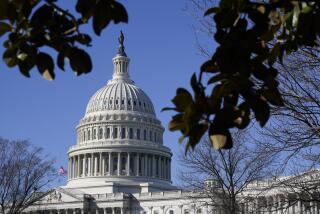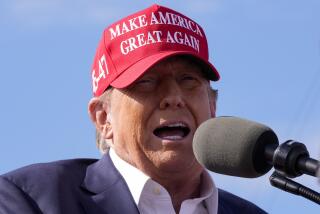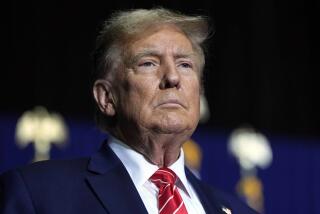‘Super PAC’ leaders profit from lack of oversight
The Red White and Blue Fund, a “super PAC” backing the presidential bid of Republican Rick Santorum, paid more than half a million dollars last month to a newly formed direct mail firm.
The owner of that company?
None other than Nick Ryan, a former Santorum aide — and founder of the Red White and Blue Fund.
Ryan’s dual roles spotlight how political operatives behind the super PACs can take advantage of the mammoth donations streaming into the funds and the lack of oversight. Of the $1.5 million that the Red White and Blue Fund spent last month, a third — $570,000 — went to Global Intermediate.
The connection between Ryan and Global Intermediate, which Ryan established two months ago, is not apparent in corporate and political filings.
Much of the focus on super PACs has been on their ability to raise unlimited sums from a cadre of super-rich donors. Less attention has been paid to how they use their money — and the fact that they do not have to contend with the same kind of internal scrutiny as the candidates and political parties they support.
“People who are raising the money are paying themselves with these funds. I don’t think that’s appropriate,” said Dale Emmons, president of the American Assn. of Political Consultants, which is studying the impact of super PACs on the industry.
“I don’t know where the check and balance is, and I have serious concerns about that,” added Emmons, a Democratic political strategist based in Kentucky.
Winning Our Future, a group backing former House Speaker Newt Gingrich that has been buoyed by $11 million in donations from casino mogul Sheldon Adelson and his family, paid its president, Becky Burkett, $206,000 in January for executive management and fundraising services, according to campaign finance reports filed this week. Gregg Phillips, the Austin-based consultant who serves as the super PAC’s managing director, got $90,000.
Winning Our Future spokesman Rick Tyler said the super PAC pays its staff for “fundraising successes.” Tyler said the payments Burkett and Phillips received in January included compensation for work they did in November and December, before the super PAC was launched on Dec 13. He said their salaries were determined by the super PAC’s “senior leadership” — which consists of himself, Burkett and Phillips.
Paul Begala, a former Clinton White House aide, made $200,000 in the last eight months working as the senior advisor to Priorities USA Action, a super PAC backing President Obama. The group has struggled to raise as much as its Republican counterparts, bringing in just under $59,000 in January and $4.4 million overall.
Begala said his compensation reflects his exclusive work overseeing the group’s strategy, polling and fundraising. He said he did not get a percentage of advertising buys, as many consultants do.
“It’s right in line with what I’ve always charged for campaign work,” he said, adding: “We’re accountable to our donors, most importantly — the people who are funding us, who are very savvy people.”
Since a series of federal court decisions in 2010 led to the creation of super PACs, 330 have been formed, according to the Federal Election Commission. That has meant a bonanza for political consultants and media firms who are free to determine how to expend the war chests. So far, super PACs have spent $51 million on the presidential campaign, according to the Center for Responsive Politics.
Art Hackney, a GOP strategist based in Alaska, said most super PACs were careful about how they spent their funds.
“There may be people who take advantage of this system, or any system, but by and large it is self-correcting,” said Hackney, who produces advertising for American Crossroads, the Republican super PAC formed in part by Karl Rove.
Several of the major super PACs are being financed by contributions from just a few wealthy donors — as is the case with the Red White and Blue Fund. The pro-Santorum group has raised $2.8 million, largely from investor Foster Friess and energy executive William J. Doré, who each put in $1 million.
A large share of that money appears to have gone back to super PAC founder Ryan, a veteran of congressional campaigns in Iowa, through Global Intermediate.
The company got more than $500,000 for direct mail and phone banks in January, as well as nearly $60,000 for “strategic and communications consulting,” according to FEC filings.
Global Intermediate did not incorporate until mid-December, when it filed paperwork in Delaware through a third-party incorporation service, shielding the identity of the firm’s agent. The group’s bare-bones website, whose domain was registered on Feb. 13, does not list the name of the firm’s principals. The mailing address listed for Global Intermediate on the super PAC’s FEC filings turned out to be the location of a UPS store in downtown Washington.
Ryan did not respond to requests for comment.
Red White and Blue Fund spokesman Stuart Roy, when asked about the firm on Tuesday, first said he had “no idea” how to contact Global Intermediate.
On Wednesday afternoon, he acknowledged in an e-mail that the company was run by Ryan, saying it was “no big mystery, they have done our phones and mail programs in multiple states (very effectively, I might add).”
Friess, in an email from northern Peru, where he is on an anniversary trip with his wife, wrote that he has never met Ryan but that he “sounds like an honest guy.”
Maloy Moore in Los Angeles contributed to this report.
More to Read
Start your day right
Sign up for Essential California for news, features and recommendations from the L.A. Times and beyond in your inbox six days a week.
You may occasionally receive promotional content from the Los Angeles Times.







